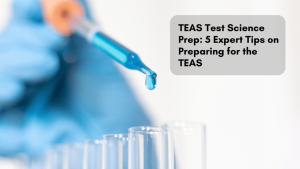Most nursing schools only accept applicants with 60-70% TEAS scores or the national percentile score. Additionally, the school may factor in your academic preparedness level, which adds to applicants’ many woes. In this guide, our academic test analysts and experts will answer the question “Is the TEAS test hard” and take you through the TEAS scoring and grading system to help expound on this question. We will also help you understand if taking TEAS a second time is a worthwhile pursuit and provide answers to core questions first-time test-takers ask.
How Is the TEAS Test Scored?
The TEAS test consists of 170 questions, but only 150 are examinable. 20 items are experimental questions used by the institution for their internal purposes, usually testing the validity of the test. The TEAS 170 questions cover four subject areas, further divided into three primary components: the sub-content score, content score, and total score. For example, the math subject or content area comprises 30 questions across four sub-content areas: measurements, data interpretation, algebraic applications, and numbers and operations. The science subject area has 48 questions spread across four sub-content areas: Scientific reasoning, Earth and physical science, the human body, and life science.
Since each subject or content area has a distinct difficulty level, they are in a specific weight that determines the final score. Thus, your final grade covers more than the individual scores per question. Instead, you will be graded based on the individual scores across each subject’s sub-content areas. The final grade, or the composite score, will be your adjusted individual score determined by your performance in all the sub-content areas.
TEAS Academic Preparedness Rating
Besides the total score, ATI, the institution administering your TEAS test, assigns test takers’ level of preparedness depending on their scores across each sub-content area. Below is a detailed breakdown to help you get the general idea.
- 0.0% to 40.7% Developmental
- 40.7 % to 58.0% Basic
- 58.7% to 79.3% Proficient
- 80.0% to 91.3% Advanced
- 92.0% to 100% Exemplary
TEAS academic preparedness rating gives universities an idea of test-takers’ adjusted individual scores. It also contains individual sub-scores with details of specific sub-content areas applicants struggled with. Test-takers who failed their TEAS test can check their academic preparedness report to determine areas to revise, especially when preparing for a retake exam.
How Fast Will I Get My TEAS Score Report?
Applicants who take their TEAS online can get their reports instantly. However, you will receive grades within 48 or 72 hours if you register for on-campus physical exams. ATI Nursing Education centers take 24 hours to grade applicants, while PSI locations take up to 72 hours.
The TEAS score report contains your performance across all sub-content areas and the final score. In addition to the final score, it outlines your academic preparedness, score range, and sub-scores.
So, Is the TEAS Test Hard?
The TEAS test can be challenging or easy, depending on how robust you prepare for it. On average, 40% of students fail this test for a few reasons. Unlike standardized exams, the TEAS exam tests applicants’ intelligence, critical thinking skills, and abilities to apply general concepts to solve various life problems. This test isn’t focused on a specific subject area. Instead, it covers a wide range of subject areas, which can be problematic for students with particular areas of interest.
On top of that, your success in the TEAS test is determined by your ATI’s requirements. Some institutions only take in learners with competitive scores (78% to 90%) or the top TEAS scores (90.7% to 100%). Thus, applicants who get less competitive scores (58.7% to 77.3%) or below-average scores (0%-58.0%) will have to apply for a retake.
Lastly, test-takers must complete the test within 209 minutes. The TEAS test is formulated to stress this time pressure with questions across various content areas. While most test-takers admit to cramming for the TEAS, they must solve these questions faster than in a standardized test.
What TEAS Questions are the Most Challenging? What to Expect on the TEAS
After answering the question, “is the TEAS test hard,” you’d want to know about the most challenging sections. While the math section trips many students with numbers, most test-takers struggle with science. The science sub-sections cover two primary sub-disciplines: biology and physiology. Both are complex topics aimed at assessing students ‘ understanding of concepts critical to nursing. Below are breakdowns for science vs. math sections to help you better understand what to expect.
TEAS Test Science Section
The TEAS test science section covers four sub-content areas, including:
- Physiology and anatomy (18 scored questions)
- Biology (9 scored questions)
- Chemistry questions (9 scored questions)
- Scientific Methods (9 scored questions)
It’s natural for learners to get many science questions across all these sub-content areas. It can be acid-base reactions, zygote formation, endocrine system, skeletal system, or DNA & Chromosomes. Simply put, the test combines your anatomy, physiology, biology, and chemistry finals in one fell swoop. What’s more depressing is that you need at least 70% to pass the ATI TEAS science section and 80-85% to get into the 90th percentile nationwide.
TEAS Math Section
ATI TEAS math section structure consists of four sub-content areas that comprise 38 questions learners need to answer in 57 minutes. Topics covered include:
- Measurement & Data: 16 Questions
- Numbers & Algebra 18 Questions
- 4 Unscored Questions
Students find this math section hard because they must apply a wide range of concepts—some of which need them to memorize formulas. Secondly, test-takers must be able to solve each math question in 1 minute and 30 seconds. That can be a tall order for applicants who are averagely proficient in math.
Is the TEAS Test Hard on the Second or Third Trial?
Every year, we meet students who admit to taking TEAS’s first official attempt as a practice test. For the registration costs involved, that would not be our recommendation. However, should you contemplate multiple attempts, is there room to improve in your subsequent trials? Unless there are glaring similarities between the first and second tests, there is no guarantee that you will perform well in the second trial. Fortunately, you can use your experience to build confidence, plan, strategize, and prepare for the retake adequately.
Is the TEAS Test Hard: Bottom Line
Is the TEAS test hard? Yes, up to 40% of TEAS applicants fail their first tests. Conversely, 60% of the test takers pass their TEAS and pursue rewarding nursing careers. Read our blog on how long to study for the TEAS exam to learn expert tips brilliant students use to ace this test in one touch. Contact our support for more questions and 1-on-1 consultations.




